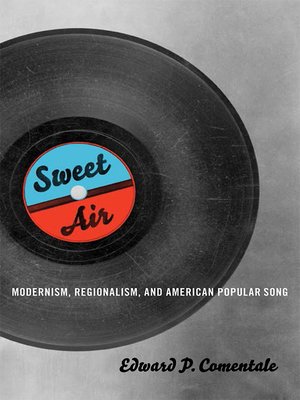Sweet Air
ebook ∣ Modernism, Regionalism, and American Popular Song · Music in American Life
By Edward P. Comentale

Sign up to save your library
With an OverDrive account, you can save your favorite libraries for at-a-glance information about availability. Find out more about OverDrive accounts.
Find this title in Libby, the library reading app by OverDrive.



Search for a digital library with this title
Title found at these libraries:
| Library Name | Distance |
|---|---|
| Loading... |
| Cover Title Page Copyright Contents List of Illustrations Acknowledgments Introduction. From a Basement on Long Island to a Mansion on the Hill Chapter One. Lord, It Just Won't Stop!: Work and Blues in the Industrial Delta Chapter Two. Thought I Had Your Heart Forever: Death, Detachment, and the Modernity of Early Chapter Three. "A Rambling Funny Streak": Woody Guthrie, Revolutionary Folk Song, and the Migrant Chapter Four. Four Elvises: On the Dada Possibilities of Midcentury Rock and Roll and Modern Fan Chapter Five. ( ) Notes Index | "In this eloquently written book Edward P. Comentale accomplishes what he sets out to do—'to disentangle vernacular music from certain romantic myths of origin and identity and explore its inherent modernism.' Highly personal, erudite, and informed, Sweet Air: Modernism, Regionalism, and American Popular Song is an original and important contribution."—The Journal of Southern History
"With the potential to be enormously influential, Sweet Air addresses American popular song as a whole while offering a compelling reinterpretation of the rise of pop music as an expansion of vernacular modernism. This book will be warmly received by a wide variety of scholars in American studies, southern studies, musicology, and popular music." —Diane Pecknold, author of The Selling Sound: The Rise of the Country Music Industry
"Sweet Air is brilliant in its way of tracing the commercial genres of popular music from their purported regionalism to a deterritorialization made possible by modern technology. An original and engaging argument about regionalism and modernity." —Barbara Ching, author of Wrong's What I Do Best: Hard Country Music and Contemporary Culture
"In his second book, Edward Comentale revisits and reconceptualizes some obscure portions of American popular music. . . .It aptly highlights the dynamics opposing mainstream culture and regional cultures in the US. . . . No one can deny this author is passionate about early American music from the South."—Journal of American Culture
"An impressive treatment of modern American popular song, marking a definite advance on celebrations of blues primitivism and inventions of a mythical musical past."—European Journal of Communication
"This profound intervention expands the appreciation of modernism and cuts through the layers of mythology and romanticization that still cloud broader understandings of American vernacular music. . . . A significant and engaging achievement."—Rock Music Studies
"Aptly highlights the dynamics opposing mainstream culture and regional cultures in the US. It is clear Comentale knows very well the American music he comments and loves."—Journal of American Culture
| Edward P....







